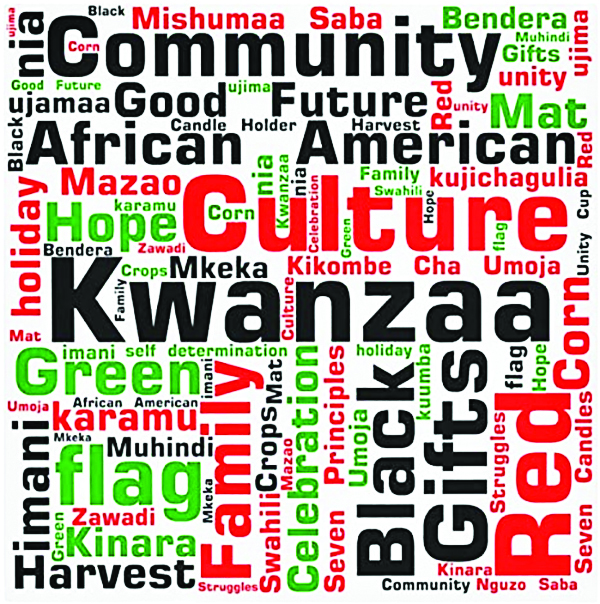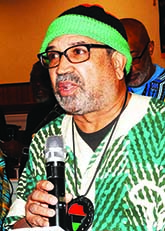
Habari Gani: A Focus on Recent Events

By Makheru Bradley
December 28, 2021 9:25PM

We titled this series Habari Gani, a Kiswahili term we use during Kwanzaa, translated as “What’s New”, or “What is the News?” Our intent is to cover recent events that impact Afrikan people.
Kwanzaa 2021: The critical need for a cultural revolution
In 1965, after the assassination of Omowale Malcolm X, after the brutal and bloody beating Afrikan Americans suffered on the Edmund Pettus Bridge in Selma, and after the Watts rebellion in Los Angeles, Dr. Maulana Karenga and a group of Afrikan people came together and formed the Organization Us—Us as opposed to them. Us put forth the argument that the key crisis and challenge in Black life was cultural, a crisis and challenge in the area of views and values—what we think and how we act. They said that until Afrikan people engaged in a cultural revolution and began to break the monopoly which our oppressors had on our minds, our liberation from the tyranny of white supremacy was not only unachievable, but it was also unthinkable. To provide a cultural grounding for his developing ideas, Dr. Karenga chose the pan-Afrikan language, KiSwahili, to express some of his concepts. At the founding of Us, Dr. Karenga introduced his philosophy of Kawaida. He defined Kawaida as a “synthesis of tradition and reason informed by practice.” Tradition is a “lived, living, and transmitted history,” and it is also a foundation. Reason is “critical reflection on past and current thought and practice and judicial selection… of what we need and determine as best.” Practice is “both the test of reason and tradition,” because in the “final analysis practice proves everything.”
Dr. Karenga also introduced the Nguzo Saba (the Seven Principles) which he regarded as the moral minimum set of values Afrikan Americans need to rebuild and strengthen family, community, and culture, and become a self-conscious social force in the struggle to control their destiny and daily life. The Nguzo Saba consists of: Umoja (Unity); Kujichagulia (Self-Determination); Ujima (Collective Work and Responsibility); Ujamaa (Cooperative Economics; Nia (Purpose); Kuumba (Creativity); Imani (Faith).
Kwanzaa, Culture, Values, and Critical Thinking
In December 1966, to help facilitate the process of cultural revolution (freeing our minds), Dr. Karenga created Kwanzaa, a seven-day celebration (December 26—January 1) of the Afrikan family, community, and culture. Culture is defined as “the totality of thought and practice by which a people creates itself, celebrates, sustains and develops itself and introduces itself to history and humanity.” Culture he says operates in at least seven fundamental areas: (1) history (2) spirituality/ethics/religion (3) social organization (4) economic organization (5) political organization (6) creative production and (7) ethos—the collective psychology we gain by activities in the other six areas. Dr. Karenga defined values as “categories of commitment and priorities which enhance or diminish human possibilities. The quality and direction of life is determined by what we consider to be important. Values are the hinge on which human possibilities turn.”
Critical thinking is one of the foundations of Kawaida Philosophy. Dr. Karenga defines critical thinking as: “Disciplined, in-depth, and inclusive reasoning about issues. It is reasoning with intellectual and ethical standards, that is standards of rationality and human sensitivity. In a European context, critical thinking essentially revolves around intellectual requirements—reasoning skills. Afrocentric critical thinking always involves both rational and emotional engagement of the issue—intellectual skills and human sensitivity, especially moral sensitivity. An Afrocentric understanding of thought process requires that we pursue and reach critical insight with both mind and heart in a disciplined, balanced and in-depth process.” Dr. Karenga says, “The true human person is never an isolated, unattached individual, but always a person-in-community with relational obligations.”
Kwanzaa 1966—2021
Kwanzaa evolved as part of the Black Liberation Movement, as the 2nd Cycle of White Supremacy in the United States—American Apartheid, was being replaced by the reforms of civil rights. The institutional forces of the White Supremacy Dynamic saw the Black Liberation Movement as a revolutionary threat to their power versus the civil rights reforms, which they believed they could control. Thus, the US government, led by the most destructive institutionalized white supremacist of the 20th century, J. Edgar Hoover, declared war on the Black Liberation Movement. A critical component of that war was instigating internecine conflict within and between various Black liberation organizations. The assassination of Omowale Malcolm X was a result of that internecine conflict, as was the dissolution of the peace between the Organization Us and the Black Panther Party. The Hoover facilitated Us-Panther conflict led to the loss of Black lives and to vitriolic personal and ideological attacks on each other. The burgeoning cultural revolution became a casualty of this war on the Black Liberation Movement, as cultural nationalism was denigrated. The current epidemic of self-destructive violence and behavior plaguing the Black community could have been ameliorated, if not prevented, had our cultural revolution not been taken out of its development. For 300-plus years, the most significant fragment we retained from our traditional culture, the sense of family and its associated socialization, insulated us, by and large, from imitating the most barbaric aspects of the spiritually barren American culture. That insulation has been shredded and we see people in the Black community committing virtually unfathomable acts of violence against small children, pregnant women, the elderly, and others. There is a critical need for a cultural revolution to rupture the impact of what Dr. Amos Wilson called, “The psychodynamics of Black self-annihilation in service of white domination.” Our seven-day Kwanzaa celebrations must become a 365-day process of cultural revolution, freeing our minds, and making the Nguzo Saba a reality in our lives.
For more from the author, follow his blog Makheru Speaks.

